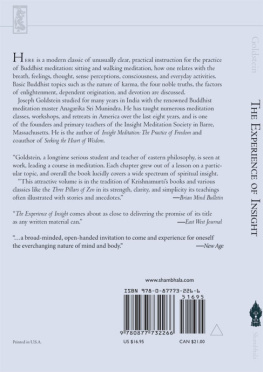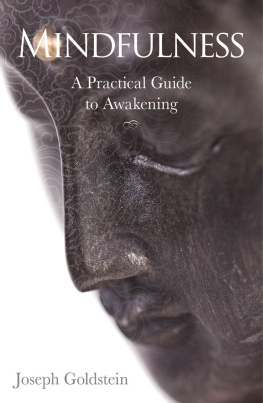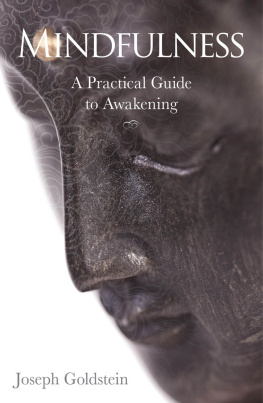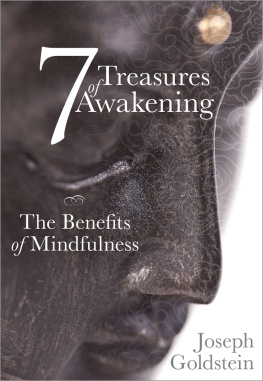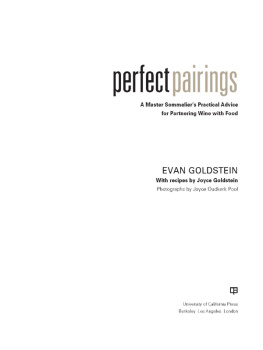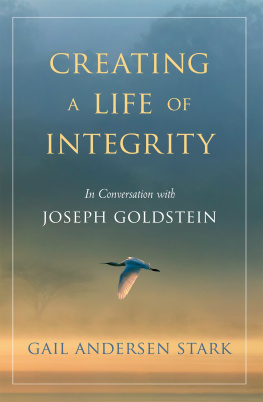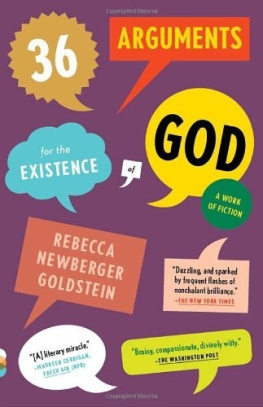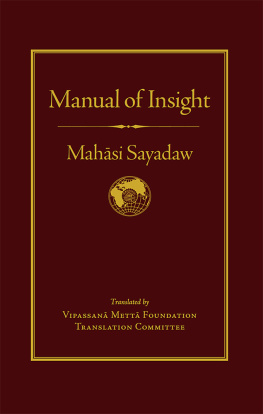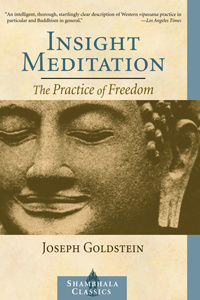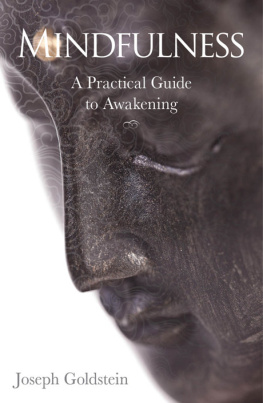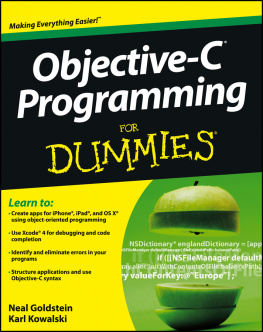Joseph Goldstein - The Experience of Insight
Here you can read online Joseph Goldstein - The Experience of Insight full text of the book (entire story) in english for free. Download pdf and epub, get meaning, cover and reviews about this ebook. year: 2017, genre: Religion. Description of the work, (preface) as well as reviews are available. Best literature library LitArk.com created for fans of good reading and offers a wide selection of genres:
Romance novel
Science fiction
Adventure
Detective
Science
History
Home and family
Prose
Art
Politics
Computer
Non-fiction
Religion
Business
Children
Humor
Choose a favorite category and find really read worthwhile books. Enjoy immersion in the world of imagination, feel the emotions of the characters or learn something new for yourself, make an fascinating discovery.
- Book:The Experience of Insight
- Author:
- Genre:
- Year:2017
- Rating:5 / 5
- Favourites:Add to favourites
- Your mark:
- 100
- 1
- 2
- 3
- 4
- 5
The Experience of Insight: summary, description and annotation
We offer to read an annotation, description, summary or preface (depends on what the author of the book "The Experience of Insight" wrote himself). If you haven't found the necessary information about the book — write in the comments, we will try to find it.
The Experience of Insight — read online for free the complete book (whole text) full work
Below is the text of the book, divided by pages. System saving the place of the last page read, allows you to conveniently read the book "The Experience of Insight" online for free, without having to search again every time where you left off. Put a bookmark, and you can go to the page where you finished reading at any time.
Font size:
Interval:
Bookmark:
Sign up to receive news and special offers from Shambhala Publications.

Or visit us online to sign up at shambhala.com/eshambhala.
THE EXPERIENCE OF INSIGHT
A Simple and Direct Guide to Buddhist Meditation
Joseph Goldstein
Introduction by Ram Dass
Preface by Robert Hall

SHAMBHALA
BOULDER
2017
Shambhala Publications, Inc.
4720 Walnut Street
Boulder, Colorado 80301
www.shambhala.com
1976 by Joseph Goldstein
All rights reserved. No part of this book may be reproduced in any form or by any means, electronic or mechanical, including photocopying, recording, or by any information storage and retrieval system, without permission in writing from the publisher.
The Library of Congress catalogs the original paperwork edition of this work as follows:
Goldstein, Joseph, 1944
The experience of insight.
Originally published: Santa Cruz, CA: Unity Press, 1976.
Includes bibliographical references.
1. Meditation (Buddhism). 1. Title.
BQ5612.G64 1983 294.3443 82-42682
eISBN 9780834840997
ISBN 9780877732266 (pbk.)
ISBN 9780394714301 (Random House: pbk.)
Preface
E very so often, a book appears that has special value for people who are students of what is. I think of books like Suzuki Roshis Zen Mind, Beginners Mind and Carlos Castanedas writings on the teachings of Don Juan. Here is another one.
This is the work of a teacher of meditation who is young, an American and, yet, who speaks from that empty, peaceful space usually associated with the old and wise ones from other cultures.
Joseph Goldstein is a unique teacher. Like all good teachers, he is a vehicle for re-introducing the ancient knowledge into the confusion of this modern world. His words ring clearly, because they are born from his own experience. He has spent many years studying and practicing the life of meditation while living in India. Now he is bringing to this country a depth of understanding that could only come from those years of practice.
He teaches meditation as a method of learning to see things as they are. His discourses are practical instructions for learning how to live with detachment and compassion. And throughout his work, he keeps that one quality essential for being a truly human teachera sense of humor.
This is a good book. It is a portrait of Joseph at work, but it also presents an actual record of the dynamics of a course in meditation. Courses, such as the one described here, guided by Joseph and his co-workers, are intense experiences in the practice of Insight Meditation. They are conducted in silence, except for the discourses and question/answer periods. The daily schedule of sitting and walking practice begins each day at 5:00 AM and extends into the late evenings, and even longer for the serious students. There are usually from 50 to 200 students practicing together, sharing a process that may include visits to hell, rides into bliss, and any other experience the mind can possibly provide.
For myself, a psychiatrist working outside the orthodox theories of my profession, Joseph has been a welcome inspiration and a wonderful friend. His understanding of the mind springs from direct confrontation, rather than the study of intellectual concepts. What he teaches is relevant and useful for all of us concerned with freedomthe liberation that only comes from the light of insight.
I hope that many of my colleagues in the helping professions find this book in their hands. It could introduce a refreshing new perspective for their work, just as knowing Joseph and the people who work with him has done for me.
Robert K. Hall, M.D.
Lomi School
San Francisco
December, 1975
Introduction
D uring my studies in India, one of the teachers who most perfectly embodied his teaching was Anagarika Munindra. The ephemeral nature of phenomena, including self, was no better demonstrated than in his absent presence. Originally a Krishnabhakta with Ananda Mayi Ma, he was drawn to Burma to pursue a Theravadin Buddhist sadhana. For many years Munindra so successfully absorbed the Pali Canon of Buddhism, an exact and complex no-nonsense blueprint of the mind, and the manner in which illusion is created and dispelled, that when I met him in Bodhgaya I found it difficult to differentiate him from the doctrine.
Despite the fact that Munindra-ji held a number of responsible administrative positions in the sacred city where Buddha had attained enlightenment, he commenced teaching. Among the students of this physically diminutive teacher was Joseph, a very tall young westerner who impressed me immediately by his power, simplicity and quiet dignity. Like me, Joseph retained his western acculturation and yet was drinking deeply from the well of another cultures insight into liberation, fully aware of the universality of the spirit.
After many years of patient study, Joseph returned to his homeland and quite humbly and simply began to offer ten day to three month long, inexpensive meditation retreats throughout the U.S. Because of my deep respect for him I was truly delighted that the west was to be blessed by his teaching. I sensed in him what I had sensed in his teachera being who could be identified with his teaching.
The living transmission of a formal teaching is a delicate matter. In the lectures transcribed in this volume we have a good example. For Joseph is another of those beings who could be called (as Jung referred to Richard Wilhelm) a gnostic intermediary; that is, one who transmits a teaching from one culture and age to another not via his intellect but through absorption into his blood and gut so that he, in truth, becomes the teaching.
Such an incorporation, a grokking, a marital union, an identity, requires that surrender to which spiritual teachings refer again and again. Such a person who is a living transmission of any teaching is the statement of the faith and surrender necessary to receive the true meaning of the work; i.e., that to which the word refers.
It is now apparent, following so much cynicism in the late 50s and early 60s, that our multifaceted exploration of the later 60s has matured into a deep and genuine spiritual seeking by literally hundreds of thousands of beings who have taken birth in the western hemisphere. I understand these past years to be a process of tuning to the dharma in a way which has retained integrity with our evolving consciousness.
Now many of us seek the deeper, purer, more esoteric teachings. And we recognize that in order to receive these teachings we must assume a meditative stance. Thus, there is an increasing demand for meditation training as both means and end. The meditation course from which the transcripts in this volume have been drawn is a highly significant contribution to our growth at this time.
This book is a blessing to which I add my own.
Ram Dass
Lama, New Mexico
July 1975
Acknowledgments
So many thanks to
STEPHEN LEVINE, Dharma friend and editor, who has untiringly nursed this project to completion.
SHARON SALZBERG, invaluable colleague in teaching and mainstay of loving support, who contributed greatly both to several chapters of this book and to its general editing.
JACK KORNFELD, co-teacher and unfailing inspiration in the Dharma.
RICHARD BARSKY, friend and associate in teaching.
SUSAN OLSHUFF, CATHY INGRAM, LIZA JONES and DONNA SPIETH who so beautifully offered their services for the monumental task of transcribing tapes and typing manuscripts.
Next pageFont size:
Interval:
Bookmark:
Similar books «The Experience of Insight»
Look at similar books to The Experience of Insight. We have selected literature similar in name and meaning in the hope of providing readers with more options to find new, interesting, not yet read works.
Discussion, reviews of the book The Experience of Insight and just readers' own opinions. Leave your comments, write what you think about the work, its meaning or the main characters. Specify what exactly you liked and what you didn't like, and why you think so.

